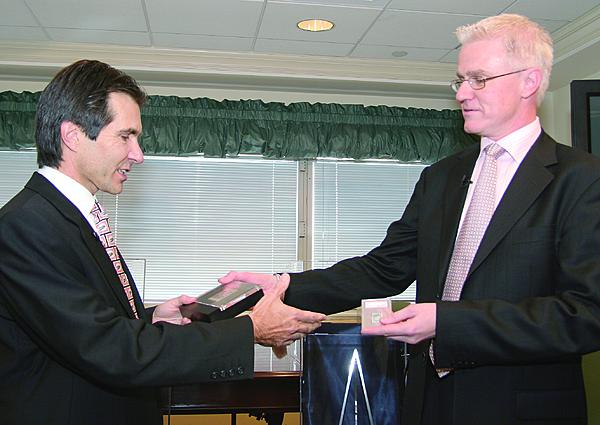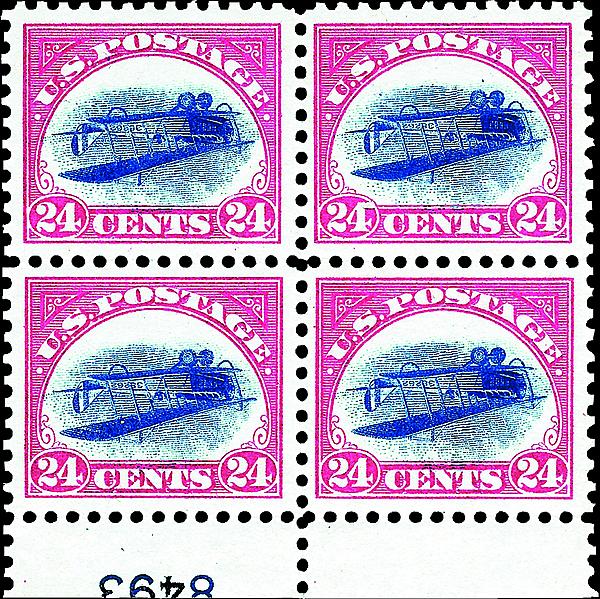US Stamps
Mystic sells Inverted Jenny plate block; purchase price ‘north of $4.8 million’
In a startling move, Donald J. Sundman, the president of Mystic Stamp Co., announced Oct. 7 that his firm has sold the unique Inverted Jenny plate block to an anonymous buyer for a sum specified as “around $5 million,” according to Sundman.
The offer to buy the block came unsolicited in a Sept. 26 phone call that took Sundman by surprise. “But it was a price I just couldn’t turn down,” he said.
Only one block of the famous United States error — the 24¢ inverted-center airmail error stamp of 1918 (Scott C3a) — has the number of the printing plate, also inverted, on the sheet margin. The error stamp is nicknamed for the Curtiss JN-4 “Jenny” biplane flying upside down in the vignette.
Sundman acquired the plate block in 2005 in a much-publicized swap with William H. Gross, the bond trader and philatelic benefactor, for the 1¢ Franklin Z grill (Scott 85A) that completed Gross’ collection of 19th-century U.S. stamps.
Sundman had bought the Z grill in 1998 for $935,000, while Gross had bought the Inverted Jenny plate block for $2.97 million just a couple weeks before the swap. Both sales were conducted by Robert A. Siegel Auction Galleries in New York.
The plate block’s estimated value in the 2015 Scott Specialized Catalog of United States Stamps and Covers, which has just been published, dropped slightly to $3.25 million, from $3.5 million in the previous edition.
In an interview Oct. 7, Sundman, sounding at times like one of Sherlock Holmes’ clients narrating a mysterious chain of events, recalled how the transaction unfolded.
The caller, who was not known to Sundman, insisted his offer was serious. He said he represented a group of clients that he would not identify, although he described them variously as “overseas” and “European” individuals who like to collect valuable things; not just stamps, but also things like historical documents. They are neither philatelists nor investors.
After a brief negotiation over the price, Sundman agreed to meet his buyer on Saturday, Oct. 4, at a bank.
Sundman brought the plate block, as well as its certificate of authenticity from the Philatelic Foundation and a copy of the Siegel auction catalog from 2005.
Sundman recalled that the latter two items surprised the buyer, who seemed to know little about stamps.
But the man did bring a certified check for the full amount, which the bank assured Sundman was valid.
“I was a little nervous, to be honest, because it was a large amount, and the tellers told me they were a little nervous too,” Sundman said. “But the money’s in my account.”
The buyer insisted the exact price not be disclosed, although he would allow it to be described, somewhat oddly, as “north of $4.8 million.”
That figure keeps the Inverted Jenny plate block squarely in first place on the list of record high prices for a U.S. philatelic item.
Worldwide, it is now second only to the British Guiana 1¢ Magenta, auctioned June 17 at Sotheby’s in New York for $9.48 million, also to an undisclosed buyer.
Before receiving the offer to sell, Sundman had promised the organizers of World Stamp Show–NY 2016 that he would exhibit it there. That appearance now seems in doubt.
As reported in Linn’s issue of Sept. 29, Sundman announced Sept. 13 that he was offering a reward of up to $100,000 on behalf of the American Philatelic Research Library for the two still-missing Inverted Jenny stamps from a block of four stolen almost 60 years ago.
That block was owned at the time of the 1955 theft by Ethel B. McCoy, who later donated to the APRL the two subsequently recovered stamps and the legal rights to the other two.
Sundman said that even though Mystic employees received a small bonus to mark the windfall sale of the Inverted Jenny plate block, many at the mail order firm based in Camden, N.Y., were sorry to see it go.
It has appeared in Mystic’s ads and marketing materials for nearly a decade, becoming part of the firm’s visual identity.
“I’m sad to see it go, too,” Sundman said.
MORE RELATED ARTICLES
Headlines
-
US Stamps
Oct 7, 2024, 3 PMMcMurtrie dismissed as APS education director following Sept. 21 arrest
-
US Stamps
Oct 7, 2024, 12 PMVasiliauskas named president of Mystic Stamp Co.
-
US Stamps
Oct 6, 2024, 5 PMApgar souvenir card available
-
US Stamps
Oct 6, 2024, 4 PMFirst Continental Congress and U.N. stamps receive Scott catalog numbers







